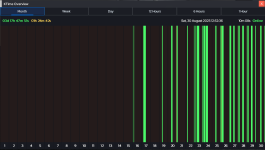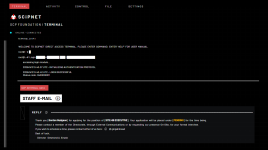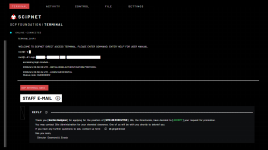Steam ID:
STEAM_0:1:150023700
Discord name:
kukoorooza
For how long have you played on CG SCP:
Around 1350 hours since 2023.

Approximately 90 hours since coming back:

Age:
25 years old.
In what country are you located?:
 USA
USA
Time zone:
Eastern Standard Time
Character name(s):
Gordon Gudgeon
Gilbert Gudgeon
Civilian name:
Scavenger Scav (Formelly Garold Gudgeon)
What server are you applying for? (SCP-RP UK or SCP-RP USA):
SCP-RP USA
Do you have a mic?:
I do.
List all whitelisted, MTF, or CI roles that you hold or have held:
Director of Research (Held)
Executive Researcher (Held)
CI Alpha (Held)
Have you received any kicks/bans/warning? and why?:
I received a warning for RDM during my first week or so on the server. I stabbed a D-class as a D-class for no reason. I now understand what I did wrong.

Why are you applying for Executive Researcher?
I am applying for the Executive Researcher position for the following reasons:
My primary motivation stems from my previous, highly positive experience in this role. I am a firm believer that passion for a position directly translates to higher quality roleplay and engagement. Because I genuinely enjoy the responsibilities that come with being an Executive Researcher, I am confident I can consistently contribute positively to the server's environment.
Furthermore, I have a passion for mentoring and guiding others. I find it very rewarding to help people understand various topics, from departmental policies to the nuances of writing research documents. Since this is a core function of an executive, my enthusiasm for teaching aligns perfectly with the demands of the role.
Lastly, I am dedicated to the principle of continuous improvement. While the research department is already in a great place, I believe there is always an opportunity to grow and refine our processes. I am eager to offer my perspective and contribute to the department's ongoing success.
What makes you suitable for Executive Researcher?:
Several key qualifications make me a suitable candidate for Executive Researcher:
My natural inclination to teach and mentor is one of my greatest strengths. An effective executive must be a patient and capable guide. I find genuine satisfaction in helping fellow researchers understand policies and improve their skills, a quality that directly supports the leadership demands of this position.
My communication philosophy is centered on sincerity and fairness. I believe that clear, honest, and respectful dialogue is the foundation of a healthy department. This approach ensures that my interactions, whether with a new Junior Researcher or a Site Director, are productive and build trust.
Finally, my extensive hands-on experience in the department provides me with invaluable insight. Spending the vast majority of my time on the server as a researcher has given me a deep understanding of its history, evolving policies, and diverse community. This background has equipped me with the adaptability to navigate any challenge, be it a procedural issue or an interpersonal situation.
How many excellent-graded documents have you written? What makes a document excellent?
I have written somewhere between 30 and 40 excellent+ documents. It is difficult to say exactly, as I have lost my documents a handful of times.
I am of the belief that 3 main factors make a document excellent:
What are the responsibilities of the Executive Researcher in RP?:
The responsibilities of an Executive Researcher fall into two main categories: administrative facilitation and leadership by example.
On the administrative side, they are the gatekeepers of departmental procedure and quality. This includes grading documents, approving credits, and crucially, authorizing tests and samplings. Their role is not simply to approve or deny; they must actively guide researchers, providing clear feedback on what needs to be changed for a test to be approved and directing them on the subsequent steps for final authorization.
In terms of leadership, they serve as active mentors and role models. They are expected to cultivate the skills of their colleagues through proactive guidance and support. A crucial part of this leadership is ensuring that all departmental and site-wide policies are upheld. The Executive Researcher must guarantee that their department operates strictly within the bounds of departmental policies, the site code of conduct, the legal codex, and the code of ethics. When these rules are violated, it is their duty to intervene, with actions ranging from constructive criticism to issuing formal punishments to maintain discipline and order. The most effective form of this leadership, however, is leading by example. An Executive Researcher must remain an active scientist, conducting their own high-quality studies and, whenever possible, bringing other researchers into their projects to foster collaborative learning and practical experience.
Please give some lore about your Executive Researcher character and what storylines they would be involved in:
Director Darby’s Welcome
Dr. Gordon Gudgeon sat at his desk in Site-65’s sprawling research department, nervously refreshing his email. For days, he had awaited a response to his application for promotion to Executive Researcher. He knew the process usually took a few days, but each passing hour felt like an eternity.
Then, it happened. A notification pinged, and there it was: an email from none other than Dr. Darby, the esteemed Director of Research. The message was brief but carried a weight of importance: "Dr. Gudgeon, please come to my office at your earliest convenience."
Gordon’s heart raced as he made his way to the Director’s office. It was a space whispered about in the halls, shrouded in both admiration and mystery. Upon entering, Gordon immediately felt the air grow heavier. The office was as grand as he imagined, with stacks of reports, artifacts from Foundation history, and a faint aroma of cigar smoke lingering in the air. But what truly caught his attention was Dr. Darby himself.
The Director of Research stood tall, his imposing figure nearly brushing the ceiling. Dr. Darby was a canine humanoid, his sleek black fur shimmering faintly under the dim lighting. His piercing red eyes glowed like embers, carrying an intensity that made Gordon instinctively straighten his posture. Darby’s sharp, angular features combined with his commanding presence left no doubt about his authority within the Foundation.
"Step inside, Dr. Gudgeon," Darby said in a deep, gravelly voice, gesturing toward a shimmering, oval portal glowing softly in the corner of the room.
Hesitant but curious, Gordon stepped through. He found himself in an entirely different space—a stunning extension of the office that seemed to exist in another dimension. The walls shimmered with iridescent light, and the view through the massive windows revealed an ethereal, otherworldly landscape filled with vibrant skies and floating islands.
Darby followed, his red eyes burning brighter in the dimness of the new space. He lit a cigar with a practiced flick of his clawed fingers and took a slow drag before speaking. "Congratulations, Dr. Gudgeon," he said, his voice carrying both authority and warmth. "You’ve been accepted as an Executive Researcher."
Gordon’s chest swelled with pride. He barely had time to respond before Dr. Darby handed him a crisp, black leather-bound handbook embossed with silver letters: Executive Researcher Guidelines.
The Director’s tone grew serious. "With this promotion comes great responsibility. You are now privy to the presence of four Overseers at Site-65 and, of course, the four Level-4 SCPs contained here: SCP-079, SCP-500, SCP-682, and SCP-008."
Darby spoke at length about each anomaly. The malevolent AI that was SCP-079, the miraculous healing pills of SCP-500, the indestructible terror of SCP-682, and the virulent danger posed by SCP-008. Gordon listened intently, his mind buzzing with a mix of excitement and trepidation. These were no ordinary anomalies—these were the Foundation’s most closely guarded secrets, and now they were part of his daily reality.
As the conversation concluded, Gordon realized just how monumental this opportunity was. He had a torrent of questions, and Darby answered each with patience, his red eyes studying the young researcher’s enthusiasm.
"You’ll find that there’s always more to learn," Darby said, a slight smirk revealing sharp, gleaming teeth beneath the haze of cigar smoke. "That’s the nature of research, after all."
Dr. Gudgeon stepped back through the portal, clutching the handbook like a precious artifact. He was no longer just another researcher; he was now entrusted with the Foundation’s most critical work. From that day forward, Gordon cherished his role, diving headfirst into his new responsibilities with a renewed sense of purpose and awe for the mysteries of the SCP Foundation.
Project Pestillence
The Vice Chairman of the Ethics Committee, Tyrone Tiggle, had a way of making waves whenever he handed down a project. This time, he issued a directive to research leadership that turned heads: figure out which SCPs, if any, could assist SCP-049 in curing—or maybe even preventing—the Pestilence. It was ambitious, risky, and loaded with uncertainty.
Dr. Gordon Gudgeon, along with Dr. Heimer, found themselves at the heart of the task. Their initial approach was straightforward enough—collect samples from other SCPs and let SCP-049 analyze them. But things didn’t go as planned. SCP-049 took one look at the samples and dismissed them outright. He claimed they were “riddled with Pestilence,” saying the contamination was inevitable after the samples had interacted with "lesser variables" (as he put it).
After days of frustrating results and some serious head-scratching, Gudgeon and Heimer finally had an epiphany: SCP-049 couldn’t work with secondhand samples. He needed to directly interact with the SCPs themselves. It wasn’t an easy call—cross-testing is always a logistical and ethical nightmare—but it was the only way forward.
What followed was a month of meticulous, high-stakes experiments. SCP-049 was introduced to every SCP on-site under carefully controlled conditions. Some tests were unremarkable, some puzzling, and one downright unforgettable.
That standout test? SCP-049’s interaction with SCP-008. The results were... bizarre. The experiment produced an SCP-049-2 instance unlike any they’d seen. It was larger—easily twice the normal size—its skin turned an angry shade of red, and it retained an eerie semblance of sentience. Worse, it was furious, thrashing and roaring as though it had a vendetta against existence itself.
Gordon stood watching the aftermath, his clipboard trembling slightly in his hands. “What did we just create?” he muttered under his breath. No one had an answer, least of all SCP-049, who seemed uncharacteristically intrigued by the outcome.
In the days that followed, the department was abuzz with theories. Was this progress, or had they stumbled onto something far more dangerous? Dr. Gudgeon wasn’t sure, but one thing was clear: this project had opened doors that couldn’t easily be closed.
STEAM_0:1:150023700
Discord name:
kukoorooza
For how long have you played on CG SCP:
Around 1350 hours since 2023.

Approximately 90 hours since coming back:

Age:
25 years old.
In what country are you located?:
Time zone:
Eastern Standard Time
Character name(s):
Gordon Gudgeon
Gilbert Gudgeon
Civilian name:
Scavenger Scav (Formelly Garold Gudgeon)
What server are you applying for? (SCP-RP UK or SCP-RP USA):
SCP-RP USA
Do you have a mic?:
I do.
List all whitelisted, MTF, or CI roles that you hold or have held:
Director of Research (Held)
Executive Researcher (Held)
CI Alpha (Held)
Have you received any kicks/bans/warning? and why?:
I received a warning for RDM during my first week or so on the server. I stabbed a D-class as a D-class for no reason. I now understand what I did wrong.

Why are you applying for Executive Researcher?
I am applying for the Executive Researcher position for the following reasons:
My primary motivation stems from my previous, highly positive experience in this role. I am a firm believer that passion for a position directly translates to higher quality roleplay and engagement. Because I genuinely enjoy the responsibilities that come with being an Executive Researcher, I am confident I can consistently contribute positively to the server's environment.
Furthermore, I have a passion for mentoring and guiding others. I find it very rewarding to help people understand various topics, from departmental policies to the nuances of writing research documents. Since this is a core function of an executive, my enthusiasm for teaching aligns perfectly with the demands of the role.
Lastly, I am dedicated to the principle of continuous improvement. While the research department is already in a great place, I believe there is always an opportunity to grow and refine our processes. I am eager to offer my perspective and contribute to the department's ongoing success.
What makes you suitable for Executive Researcher?:
Several key qualifications make me a suitable candidate for Executive Researcher:
My natural inclination to teach and mentor is one of my greatest strengths. An effective executive must be a patient and capable guide. I find genuine satisfaction in helping fellow researchers understand policies and improve their skills, a quality that directly supports the leadership demands of this position.
My communication philosophy is centered on sincerity and fairness. I believe that clear, honest, and respectful dialogue is the foundation of a healthy department. This approach ensures that my interactions, whether with a new Junior Researcher or a Site Director, are productive and build trust.
Finally, my extensive hands-on experience in the department provides me with invaluable insight. Spending the vast majority of my time on the server as a researcher has given me a deep understanding of its history, evolving policies, and diverse community. This background has equipped me with the adaptability to navigate any challenge, be it a procedural issue or an interpersonal situation.
How many excellent-graded documents have you written? What makes a document excellent?
I have written somewhere between 30 and 40 excellent+ documents. It is difficult to say exactly, as I have lost my documents a handful of times.
I am of the belief that 3 main factors make a document excellent:
- An interesting idea. I think the most crucial factor for making a document excellent is how good of an idea is behind it. I have seen a plethora of documents that are formatted well, flow decently but, in essence, have no substance behind them because the original idea was, bluntly put, dull. Good ideas usually do one or more of the following: generate interestign roleplay, are based on game mechanics, cleverly involve a gamemaster, or are unique or put a unique spin on an old idea.
- Examples of interesting ideas:
- What happens if a person views a photo of SCP-096 and is then immediately transported to the helpers' dimension?
- Can SCP-096 be terminated using SCP-409? (Good for GM involvement)
- Can SCP-079 pass the turing test? (Excellent for RP)
- Exemples of not so interesting ideas:
- What happens if a D-class sees a photo of SCP-096? (We know exactly what happens)
- Can a D-class withstand the effects of SCP-3078? (No, they can't. This idea could be more interesting with a modifier, ie with scrambles)
- Examples of interesting ideas:
- Proper format. An excellent study must loosely follow the scientific method. This usually includes a goal of study, hypothesis, methodology, results, and a conclusion. Proper formatting also includes making the document look presentable. This might include adding a cover page, an index, adding lines to separate items of a page etc.
- Proper grammar. Documents with excellent formatting and a decent idea will not be labeled ecellent if the grammar is improper. As such, a researcher who strives to create an excellent document must review their documents for errors and make revisions.
What are the responsibilities of the Executive Researcher in RP?:
The responsibilities of an Executive Researcher fall into two main categories: administrative facilitation and leadership by example.
On the administrative side, they are the gatekeepers of departmental procedure and quality. This includes grading documents, approving credits, and crucially, authorizing tests and samplings. Their role is not simply to approve or deny; they must actively guide researchers, providing clear feedback on what needs to be changed for a test to be approved and directing them on the subsequent steps for final authorization.
In terms of leadership, they serve as active mentors and role models. They are expected to cultivate the skills of their colleagues through proactive guidance and support. A crucial part of this leadership is ensuring that all departmental and site-wide policies are upheld. The Executive Researcher must guarantee that their department operates strictly within the bounds of departmental policies, the site code of conduct, the legal codex, and the code of ethics. When these rules are violated, it is their duty to intervene, with actions ranging from constructive criticism to issuing formal punishments to maintain discipline and order. The most effective form of this leadership, however, is leading by example. An Executive Researcher must remain an active scientist, conducting their own high-quality studies and, whenever possible, bringing other researchers into their projects to foster collaborative learning and practical experience.
Please give some lore about your Executive Researcher character and what storylines they would be involved in:
Dr. Gudgeon’s backstory is available here.
Additionally, below are two of my favorite RP experiences on the server. I hold them near and dear and attribute a lot of my love for the research department to them.
Director Darby’s Welcome
Dr. Gordon Gudgeon sat at his desk in Site-65’s sprawling research department, nervously refreshing his email. For days, he had awaited a response to his application for promotion to Executive Researcher. He knew the process usually took a few days, but each passing hour felt like an eternity.
Then, it happened. A notification pinged, and there it was: an email from none other than Dr. Darby, the esteemed Director of Research. The message was brief but carried a weight of importance: "Dr. Gudgeon, please come to my office at your earliest convenience."
Gordon’s heart raced as he made his way to the Director’s office. It was a space whispered about in the halls, shrouded in both admiration and mystery. Upon entering, Gordon immediately felt the air grow heavier. The office was as grand as he imagined, with stacks of reports, artifacts from Foundation history, and a faint aroma of cigar smoke lingering in the air. But what truly caught his attention was Dr. Darby himself.
The Director of Research stood tall, his imposing figure nearly brushing the ceiling. Dr. Darby was a canine humanoid, his sleek black fur shimmering faintly under the dim lighting. His piercing red eyes glowed like embers, carrying an intensity that made Gordon instinctively straighten his posture. Darby’s sharp, angular features combined with his commanding presence left no doubt about his authority within the Foundation.
"Step inside, Dr. Gudgeon," Darby said in a deep, gravelly voice, gesturing toward a shimmering, oval portal glowing softly in the corner of the room.
Hesitant but curious, Gordon stepped through. He found himself in an entirely different space—a stunning extension of the office that seemed to exist in another dimension. The walls shimmered with iridescent light, and the view through the massive windows revealed an ethereal, otherworldly landscape filled with vibrant skies and floating islands.
Darby followed, his red eyes burning brighter in the dimness of the new space. He lit a cigar with a practiced flick of his clawed fingers and took a slow drag before speaking. "Congratulations, Dr. Gudgeon," he said, his voice carrying both authority and warmth. "You’ve been accepted as an Executive Researcher."
Gordon’s chest swelled with pride. He barely had time to respond before Dr. Darby handed him a crisp, black leather-bound handbook embossed with silver letters: Executive Researcher Guidelines.
The Director’s tone grew serious. "With this promotion comes great responsibility. You are now privy to the presence of four Overseers at Site-65 and, of course, the four Level-4 SCPs contained here: SCP-079, SCP-500, SCP-682, and SCP-008."
Darby spoke at length about each anomaly. The malevolent AI that was SCP-079, the miraculous healing pills of SCP-500, the indestructible terror of SCP-682, and the virulent danger posed by SCP-008. Gordon listened intently, his mind buzzing with a mix of excitement and trepidation. These were no ordinary anomalies—these were the Foundation’s most closely guarded secrets, and now they were part of his daily reality.
As the conversation concluded, Gordon realized just how monumental this opportunity was. He had a torrent of questions, and Darby answered each with patience, his red eyes studying the young researcher’s enthusiasm.
"You’ll find that there’s always more to learn," Darby said, a slight smirk revealing sharp, gleaming teeth beneath the haze of cigar smoke. "That’s the nature of research, after all."
Dr. Gudgeon stepped back through the portal, clutching the handbook like a precious artifact. He was no longer just another researcher; he was now entrusted with the Foundation’s most critical work. From that day forward, Gordon cherished his role, diving headfirst into his new responsibilities with a renewed sense of purpose and awe for the mysteries of the SCP Foundation.
Project Pestillence
The Vice Chairman of the Ethics Committee, Tyrone Tiggle, had a way of making waves whenever he handed down a project. This time, he issued a directive to research leadership that turned heads: figure out which SCPs, if any, could assist SCP-049 in curing—or maybe even preventing—the Pestilence. It was ambitious, risky, and loaded with uncertainty.
Dr. Gordon Gudgeon, along with Dr. Heimer, found themselves at the heart of the task. Their initial approach was straightforward enough—collect samples from other SCPs and let SCP-049 analyze them. But things didn’t go as planned. SCP-049 took one look at the samples and dismissed them outright. He claimed they were “riddled with Pestilence,” saying the contamination was inevitable after the samples had interacted with "lesser variables" (as he put it).
After days of frustrating results and some serious head-scratching, Gudgeon and Heimer finally had an epiphany: SCP-049 couldn’t work with secondhand samples. He needed to directly interact with the SCPs themselves. It wasn’t an easy call—cross-testing is always a logistical and ethical nightmare—but it was the only way forward.
What followed was a month of meticulous, high-stakes experiments. SCP-049 was introduced to every SCP on-site under carefully controlled conditions. Some tests were unremarkable, some puzzling, and one downright unforgettable.
That standout test? SCP-049’s interaction with SCP-008. The results were... bizarre. The experiment produced an SCP-049-2 instance unlike any they’d seen. It was larger—easily twice the normal size—its skin turned an angry shade of red, and it retained an eerie semblance of sentience. Worse, it was furious, thrashing and roaring as though it had a vendetta against existence itself.
Gordon stood watching the aftermath, his clipboard trembling slightly in his hands. “What did we just create?” he muttered under his breath. No one had an answer, least of all SCP-049, who seemed uncharacteristically intrigued by the outcome.
In the days that followed, the department was abuzz with theories. Was this progress, or had they stumbled onto something far more dangerous? Dr. Gudgeon wasn’t sure, but one thing was clear: this project had opened doors that couldn’t easily be closed.

 Game Master
Game Master
 Platform Team
Platform Team
